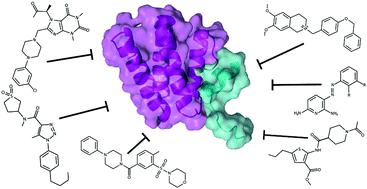当前位置:
X-MOL 学术
›
RSC Chem. Biol.
›
论文详情
Our official English website, www.x-mol.net, welcomes your
feedback! (Note: you will need to create a separate account there.)
Targeting protein–protein interactions in the DNA damage response pathways for cancer chemotherapy
RSC Chemical Biology ( IF 4.2 ) Pub Date : 2021-06-21 , DOI: 10.1039/d1cb00101a Kerry Silva McPherson 1 , Dmitry M Korzhnev 1
RSC Chemical Biology ( IF 4.2 ) Pub Date : 2021-06-21 , DOI: 10.1039/d1cb00101a Kerry Silva McPherson 1 , Dmitry M Korzhnev 1
Affiliation

|
Cellular DNA damage response (DDR) is an extensive signaling network that orchestrates DNA damage recognition, repair and avoidance, cell cycle progression and cell death. DDR alteration is a hallmark of cancer, with the deficiency in one DDR capability often compensated by a dependency on alternative pathways endowing cancer cells with survival and growth advantage. Targeting these DDR pathways has provided multiple opportunities for the development of cancer therapies. Traditional drug discovery has mainly focused on catalytic inhibitors that block enzyme active sites, which limits the number of potential drug targets within the DDR pathways. This review article describes the emerging approach to the development of cancer therapeutics targeting essential protein–protein interactions (PPIs) in the DDR network. The overall strategy for the structure-based design of small molecule PPI inhibitors is discussed, followed by an overview of the major DNA damage sensing, DNA repair, and DNA damage tolerance pathways with a specific focus on PPI targets for anti-cancer drug design. The existing small molecule inhibitors of DDR PPIs are summarized that selectively kill cancer cells and/or sensitize cancers to front-line genotoxic therapies, and a range of new PPI targets are proposed that may lead to the development of novel chemotherapeutics.
中文翻译:

针对癌症化疗 DNA 损伤反应途径中的蛋白质-蛋白质相互作用
细胞 DNA 损伤反应 (DDR) 是一个广泛的信号网络,可协调 DNA 损伤识别、修复和避免、细胞周期进展和细胞死亡。 DDR 改变是癌症的一个标志,一种 DDR 能力的缺陷通常通过依赖替代途径来补偿,从而赋予癌细胞生存和生长优势。针对这些 DDR 途径为癌症疗法的开发提供了多种机会。传统的药物发现主要集中在阻断酶活性位点的催化抑制剂上,这限制了 DDR 途径中潜在药物靶标的数量。这篇综述文章描述了针对 DDR 网络中必需的蛋白质-蛋白质相互作用 (PPI) 的癌症治疗药物开发的新兴方法。讨论了基于结构的小分子 PPI 抑制剂设计的总体策略,随后概述了主要的 DNA 损伤传感、DNA 修复和 DNA 损伤耐受途径,特别关注抗癌药物设计的 PPI 靶点。总结了现有的 DDR PPI 小分子抑制剂,可选择性杀死癌细胞和/或使癌症对一线基因毒性疗法敏感,并提出了一系列新的 PPI 靶点,可能会导致新型化疗药物的开发。
更新日期:2021-06-28
中文翻译:

针对癌症化疗 DNA 损伤反应途径中的蛋白质-蛋白质相互作用
细胞 DNA 损伤反应 (DDR) 是一个广泛的信号网络,可协调 DNA 损伤识别、修复和避免、细胞周期进展和细胞死亡。 DDR 改变是癌症的一个标志,一种 DDR 能力的缺陷通常通过依赖替代途径来补偿,从而赋予癌细胞生存和生长优势。针对这些 DDR 途径为癌症疗法的开发提供了多种机会。传统的药物发现主要集中在阻断酶活性位点的催化抑制剂上,这限制了 DDR 途径中潜在药物靶标的数量。这篇综述文章描述了针对 DDR 网络中必需的蛋白质-蛋白质相互作用 (PPI) 的癌症治疗药物开发的新兴方法。讨论了基于结构的小分子 PPI 抑制剂设计的总体策略,随后概述了主要的 DNA 损伤传感、DNA 修复和 DNA 损伤耐受途径,特别关注抗癌药物设计的 PPI 靶点。总结了现有的 DDR PPI 小分子抑制剂,可选择性杀死癌细胞和/或使癌症对一线基因毒性疗法敏感,并提出了一系列新的 PPI 靶点,可能会导致新型化疗药物的开发。











































 京公网安备 11010802027423号
京公网安备 11010802027423号